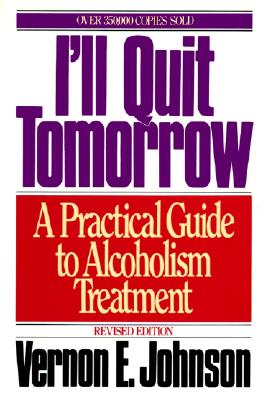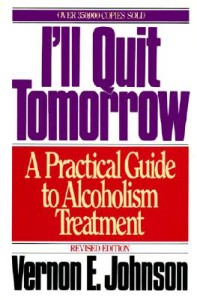Through reading glasses* under a porch light in the backyard**, I spent a lot of last night reading I’ll Quit Tomorrow: A Practical Guide to Alcoholism Treatment. I finished the book late this morning. Assigned reading for my substance abuse counseling class, the book is designed for substance abuse counselors, originally published in 1980 and written by Vernon E. Johnson, “founder and president emeritus of the Johnson Institute in Minneapolis,” a treatment facility for alcoholics and their families.
I didn’t expect to enjoy the book, because I judged it by its cover (no offense to its designer, should by way of internet miracle, he or she stumble upon this post). But now, I am really glad that my professor assigned it. What the future holds regarding the population of people with whom I’ll work as a therapist has yet to be revealed, but should I wind up working with alcoholics or their families, some of what I got out of this book — the third book I’ve read in 2012 — will help me do it. And some of the excerpts I’ll share below might resonate with anybody who has or hasn’t been affected by alcoholism.
“The obvious question at this point is, ‘Why don’t these people see what is happening to them and quit drinking?’ … However, as one might expect, it is the wrong question. … If you drop ‘and quit drinking’ from this inquiry, then you get to the real question: ‘Why don’t they see what is happening to them?’ The answer is, they can’t. … Their defense systems continue to grow, so that they can survive in the face of their problems. The greater the pain, the higher and more rigid the defenses become; and this whole process is unconscious. Alcoholics do not know what is happening inside of themselves. Finally, they actually become victims of their own defense mechanisms. … Not only are they unaware of their highly developed defense systems, they are also unaware of the powerful feelings … buried behind them, sealed off from conscious knowledge, but explosively active. Because of this, judgment is progressively impaired–and impaired judgment, by definition, does not know it is impaired.” -pages 27-28
“Now another powerful system of defense, equally unconscious, swings into action, namely, projection. Projection [in the realm of alcoholism, anyway] is the process of unloading self-hatred onto others. Again, the alcoholic does not know what is actually happening. The more hateful alcoholics unconsciously see themselves to be, the more they will come to see themselves as surrounded by hateful people. ‘They are always trying to run my life,’ or ‘They are messing things up and making it harder for me!’ … In any case, this load of self-hatred must be dumped in order for alcoholics to survive.” -page 31
Regarding what the wife of an alcoholic husband might say:
“… she reaches the point at which she actually says, ‘I couldn’t care less what happens to him.’ Whereas, of course, all sane persons do care when the very structure of their established lives is being seriously threatened. If it were true that she did not care, it would be a mark of illness, not health. What she must learn is how not to be careless, but how to care and still cope.” -page 95
And this is true regardless of whether you are or know an alcoholic:
“To put it exactly, the goal is to help the patient learn to discern accurately what his own behavior does to the other person emotionally. It is essential to know one’s own feelings at a given moment, but in a life in relationship it is necessary to sense with equal accuracy the feelings of the other person. More particularly, it is important to recognize how one’s own behavior influences someone else’s emotional response. … It is obvious, of course, that without personal insight empathy is impossible. One must be in touch with one’s own feelings in order to have any real appreciation or understanding of another’s.” -pages 96-97
*It’s true. I have reading glasses.
**Also true. We can do that in February in Florida. 🙂


